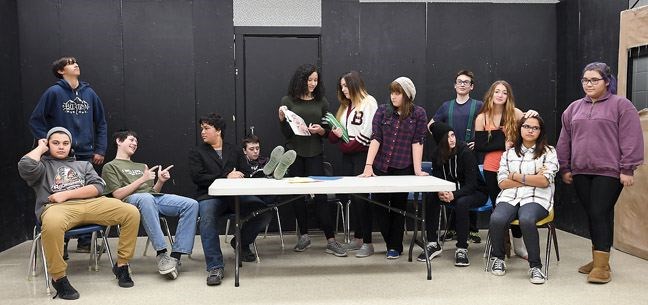If there's a single word to describe the teenage condition it might well be alienated. Ask any adult how their teen years felt, and you'll often get descriptions of feeling out of place, alone, misunderstood, disconnected from what was cool or popular.
Ask any teen the same question and they hardly even have to answer; they wear it on their sleeves (or in their hair or dangling from various facial features).
If there's a single class where the teenage condition can be openly discussed and explored and seen from new perspectives it might well be drama.
In Shannon Schinkel's Drama 10 class (which has a smattering of younger grades as well), they even put that pivotal word to use. Alienated is the name of the play they are about to perform for the public, and perhaps ironically it is an ensemble cast of about 25 characters.
"Almost all of them are on the stage for most of the play," said teacher-director Schinkel.
"The play is about this large group of students and one of them, Cammie, insists there is an alien among them. She's trying to figure out who it is, so we go along with her as the audience, to discover at the end who the alien is, if there even is one."
The symbolism is ripe. Each of the characters is written as a caricature of a stereotypical high school student. There's the cynic, the prom queen, the jock, the diva, the band geek, etc.
Schinkel used the casting process to point as many students as possible out of their personal identity zones.
"I've known some of them for a couple of years now, so my challenge was to give them characters that made them explore who they aren't," she said.
They play is, overall, a comedy, so the students have those sparks of hope and humour to work with, even if the character isn't cast for their type.
"I like the ability to express myself through acting," said Phoenix Bushell, 14. "You get to meet new people, experience the world in ways other classes don't even touch on. Being in a character gives you the chance to experience behaviours that aren't yours. My character in the play is not at all like I am, so you get to see the world through someone else's eyes."
Bree Craig, 14, said she took the class because she saw genuine enthusiasm from Mrs. Schinkel about love of teaching drama.
"I talked to her a lot last year about my problems and stuff. I saw how she liked it so much, so I made it my elective. It's my fave," Craig said.
"My character is Grace. She's a clutz. In real life I'm a graceful person, I play sports, I'm not fragile at all like her. I have to practice my role a lot at home to make those feelings real."
Wylie Watson, 13, sat in rehearsal wearing a Motorhead shirt his uncles got him as a present. Over it is a leather jacket that belonged to his grandfather. Around his neck is a studded dog collar. It's the garb of his rocker character Lloyd.
"He's laid back - the kind of guy who would sulk at the back of the class. I'm only like that in math," said Watson, who had experience in elementary school drama productions and carried the interest into PGSS.
"I saw Mrs. Schinkel's plays last year. My brother was in some duologues and we played some theatre games when they did those performances. Mrs. Schinkel let the audience participate so I just loved that experience, so when I got here I signed up for drama. It's been everything I expected."
Another component to the play is the experience the students get working on all aspects of a production.
They (and related classes like stagecraft) have to acquire costumes, acquire props, do the marketing work of making posters or presenting public address announcements for the school's daily announcements.
They also have to use their good fortune to help others. The play is a fundraiser for a worthy cause chosen as a class.
They chose to raise money and awareness for Rett Syndrome. Bushell's younger sister is one of B.C.'s few sufferers of the neuro-developmental disorder that almost exclusively affects female babies.
"My sister Gryphon is five, she is a very sweet girl, and has a lot of punch in her personality," said Bushell. Gryphon uses a computer program to communicate, has no ability to speak, and has a collection of other effects caused by the infrequent genetic mutation.
"It really needs awareness. People used to believe it was a severe form of autism, but now it's known to be a disorder all on its own."
Anyone who comes to see Alientated is asked to donate to the Rett Syndrome fund the drama students are collecting. There is no general admission charge.
Alienated happens at Vanier Hall on Thursday at 1:45 p.m. and again at 7 p.m.



